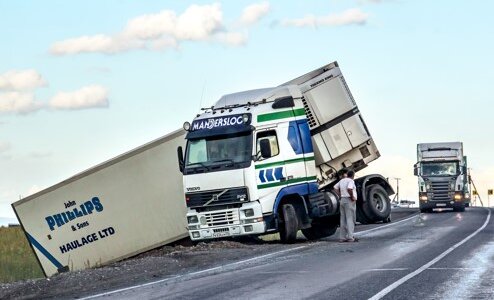A jackknife accident occurs when the trailer of a truck swings out to the side, forming an angle with the cab that resembles a folding pocketknife. This often causes the driver to lose control, leading to serious collisions with nearby vehicles. Jackknifing can happen quickly and without warning, especially when road conditions are poor or cargo is unstable. While these accidents are often associated with large commercial trucks, they can also happen to any vehicle towing a trailer.
Preventing a jackknife takes a combination of proper training, awareness, and quick thinking behind the wheel. Understanding the common causes and knowing how to respond in the moment can help reduce the risk.
Common Causes of Jackknifing
Jackknifing is usually the result of a loss of control, often due to how a truck or trailer reacts to sudden changes in speed or road conditions. Contributing factors include:
- Braking too suddenly, especially with a light or empty trailer
- Wet, icy, or slick road surfaces
- Poorly balanced or overloaded cargo
- Driving too fast for the conditions
- Improper use of engine brakes on downhill grades
- Inexperienced drivers or improper backing techniques
These conditions can cause the trailer to push forward at a different rate than the cab, forcing the two parts of the vehicle into a dangerous angle. When the trailer loses traction before the cab does, a jackknife becomes more likely.
How Truck Drivers Can Reduce the Risk
There are practical ways to reduce the likelihood of a jackknife. Truck drivers and anyone towing a trailer can benefit from the following strategies:
- Brake gradually. Avoid sudden or hard braking whenever possible, especially in wet or icy conditions.
- Downshift before a curve. Entering a curve too fast and braking mid-turn is a common setup for a jackknife.
- Maintain proper following distance. This gives you more time to react to hazards without slamming the brakes.
- Evenly distribute cargo weight. Make sure the trailer has a low center of gravity and avoid overloading.
- Use anti-lock braking systems (ABS). ABS can help maintain control during emergency braking situations.
- Practice safe backing techniques. For example, place one hand at the bottom of the wheel and keep visual control of the trailer’s movement.
- Be extra cautious with empty trailers. They offer less traction and are more likely to slide.
If a jackknife begins, releasing the brake or accelerating slightly, depending on the cause, may help realign the cab and trailer.
Jackknife Accidents and Weather Conditions
Poor weather plays a significant role in many jackknife accidents. Rain, snow, and ice reduce traction and increase stopping distances. In California, even light rain after a dry spell can create slick conditions that catch drivers off guard.
When jackknifing happens during inclement weather, liability can be complex. Truck drivers are expected to adjust their speed and behavior based on road conditions. If a driver fails to reduce speed or uses improper braking techniques on wet roads, they may be considered negligent even if the weather played a role.
In some cases, drivers are injured because they were forced to jackknife in an effort to avoid a more serious crash. If another party’s actions caused the chain of events (e.g., a sudden cut-off or defective equipment), that party could be held partially or fully liable.
What to Do After a Jackknife Accident
If you’re involved in a jackknife truck accident, whether as a truck driver or another motorist, your first priority should be safety. Move to a safe location if possible and call 911 to report the accident. Seek immediate medical attention, even if injuries don’t seem severe at first. Adrenaline can mask symptoms in the moment.
Try to gather as much information as you can, including:
- Contact details of all parties involved
- Insurance information
- Photos of the scene, damage, and weather conditions
- Names and statements from witnesses
When speaking to insurers, be cautious. Insurance companies may try to limit their payout or blame you for the incident. Before giving a recorded statement, consider speaking with an attorney.
How We Can Help You
Jackknife accidents are not always straightforward. Liability may involve the truck driver, the trucking company, a parts manufacturer, or even another motorist. If you’ve been injured in a jackknife crash, we can help determine who’s responsible and whether you’re entitled to compensation.
At Casper, Meadows, Schwartz & Cook, we have decades of experience handling serious truck accident claims across California. Whether you’re a driver hurt on the job or a motorist injured in a collision, we’re here to fight for your recovery.
Call us today for a free consultation. We’ll help you understand your rights and take the steps needed to pursue justice.

